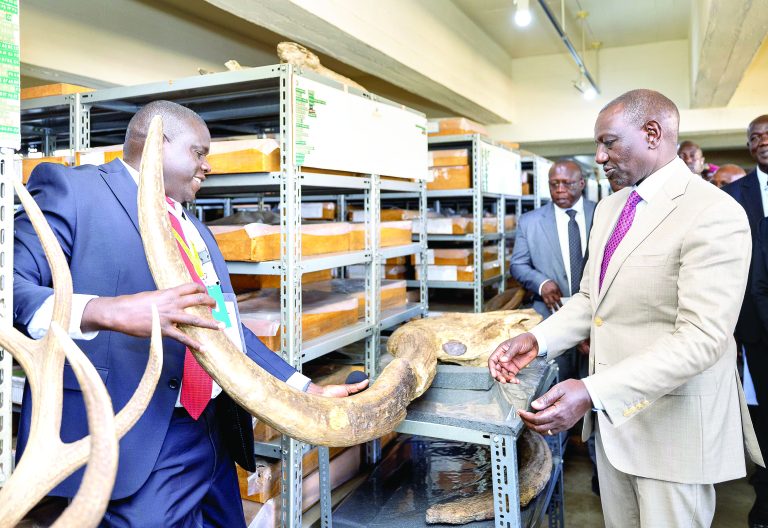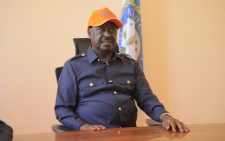Ruto hails UK for returning colonial era digital archives

President William Ruto has acknowledged the UK government’s handover of digital archives from the colonial era, saying this calls for the expansion of storage capacity for the country’s artefacts.
Last Friday, British High Commissioner to Kenya, Neil Wigan announced the formal handover of digital archives from the colonial era kept in the British archives, dating from 1907 to 1968.
“They consist of 2,658 files, over 300,000 images, taking five hard drives and almost 10 terabytes of data,” Wigan said at the National Museum of Kenya (NMK), where Ruto led celebrations on the inscription of the Gedi Ruins in Kilifi county onto the United Nations Educational, Scientific and Cultural Organisation’s (Unesco) list of World Heritage Sites.
The archives as announced by the envoy include files from the Ministry of Internal Security, the Office of the Governor, and other colonial government institutions.
Further, they included files documenting the Mau Mau period, intelligence reports and summaries of African political parties, associations, and leaders.
“So we’re handing over some of the most sensitive files on the most sensitive issues on the most sensitive times.
“Besides handing over the files, we’re also handing over the technology, a server, software, and laptops to the Kenyan National Archives, so that Kenyan researchers and historians can use these archives to tell Kenya’s history properly,” Wigan said, adding that the gesture is part of the British government’s commitment to be as open as possible about the shared history. This, he said, includes the two countries’ darkest moments.
“We aim to engage and to listen and to build our ties with communities impacted by colonial rule,” he summarised his statement.
Last month, Wigan revealed he handed over medals to 20 Kenyan veterans of the Second World War. “We’re doing this because we believe that to focus on the future, we need to address our past in this open way,” he said.
In acknowledgement, Ruto said the many assets and historical artefacts housed at the NMK require proper storage. “I have gone through what we have, and I have seen their condition. That is not how they should be. They should be in a better environment, because we risk, actually, these very important assets going to waste,” the President said.
Historical assets
Therefore, Ruto stated there’s need to expand the physical facilities at the NMK, and at Uhuru Gardens, in order to create an appropriate storage, and display of the wealth of historical assets that Kenya possesses.
Consequently, he announced that the government will set aside Sh1 billion for the expansion, to facilitate construction of another building at the NMK, and a bigger one at Uhuru Gardens.
“This is important so that we have all these things locked up in places, and we can display them appropriately,” President Ruto said, calling on partners to support creation of a small fund where resources can be put to expand storage of the artefacts and their storage.
He cited the example of British government taking the first step in handing over the historical documents, and pledging commitment to discuss colonialism and its impact on Kenyans openly.
“I am sure we have friends and partners in our meeting, friends and partners who share the past with us. If we can put our resources together, maybe we can also ask Unesco to help us mobilise some resources, so that we can better protect this heritage,” he said in an event where he also raised concern over the current global heritage monument approaches, which he noted have sidelined Africa.
Raises questions
Ruto pointed out that he can’t understand how a continent of 54 nations and 1.4 million people, contributes only 147 listed elements, about a mere 10 percent of Unesco’s World Heritage Sites.
He noted that this often fails to align with African culture context, and creates a disconnect between international heritage discourse and local realities.
“This raises questions about the fairness and maybe the methodology and foundations of current classification and listing mechanisms, suggesting that Africa may not be receiving equitable representation,” he said.
As a result, Kenya will host the International Conference on Heritage Authenticity in May 2025, where most of these issues will be ventilated.
“I eagerly anticipate the Nairobi Declaration on Heritage Authenticity,” Ruto said.
The Nairobi Declaration is expected to inform the necessary changes and enhance Africa’s heritage listing.
Kenya’s natural and cultural sites, including the National Museum of Kenya, are among the most visited, and as revealed by the Museum’s Director General, Mary Gikungu it received 1, 078, 780 visitors in 2023.
The NMK is mandated by the law with the task of nurturing and inspiring heritage tourism as a niche product, and Gikungu noted that this is so far partly illustrated by over 400 gazetted sites and monuments of national and international importance.
“This tapestry of rich cultural and natural heritage is what defines us, making us unique and proud. NMK is therefore a key player in the tourism sector,” she said.
Curated items
The preservation of the early Swahili civilization, Gikungu said as epitomised in the Historical Town of Gedi has been a long journey, which culminated in Gedi being inscribed as Kenya’s 8th Unesco World Heritage Site on July 29, 2024. This was due to its outstanding universal value.
With over 10 million curated items and drawing domestic and international tourists, the NMK houses one of Africa’s largest scientific collections.
Gikungu said the collections represent ground-breaking research whose impact extends beyond the country’s borders.












